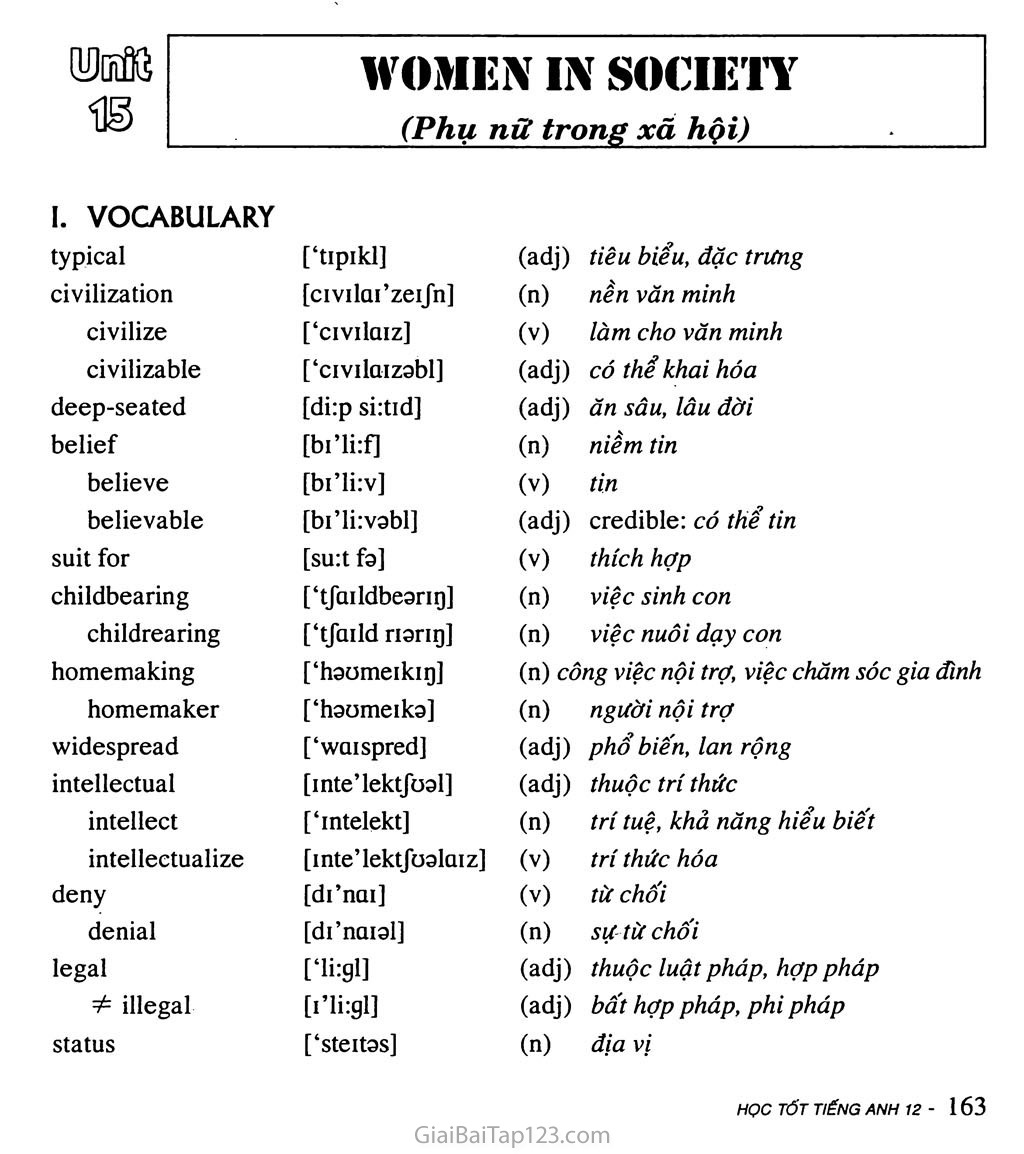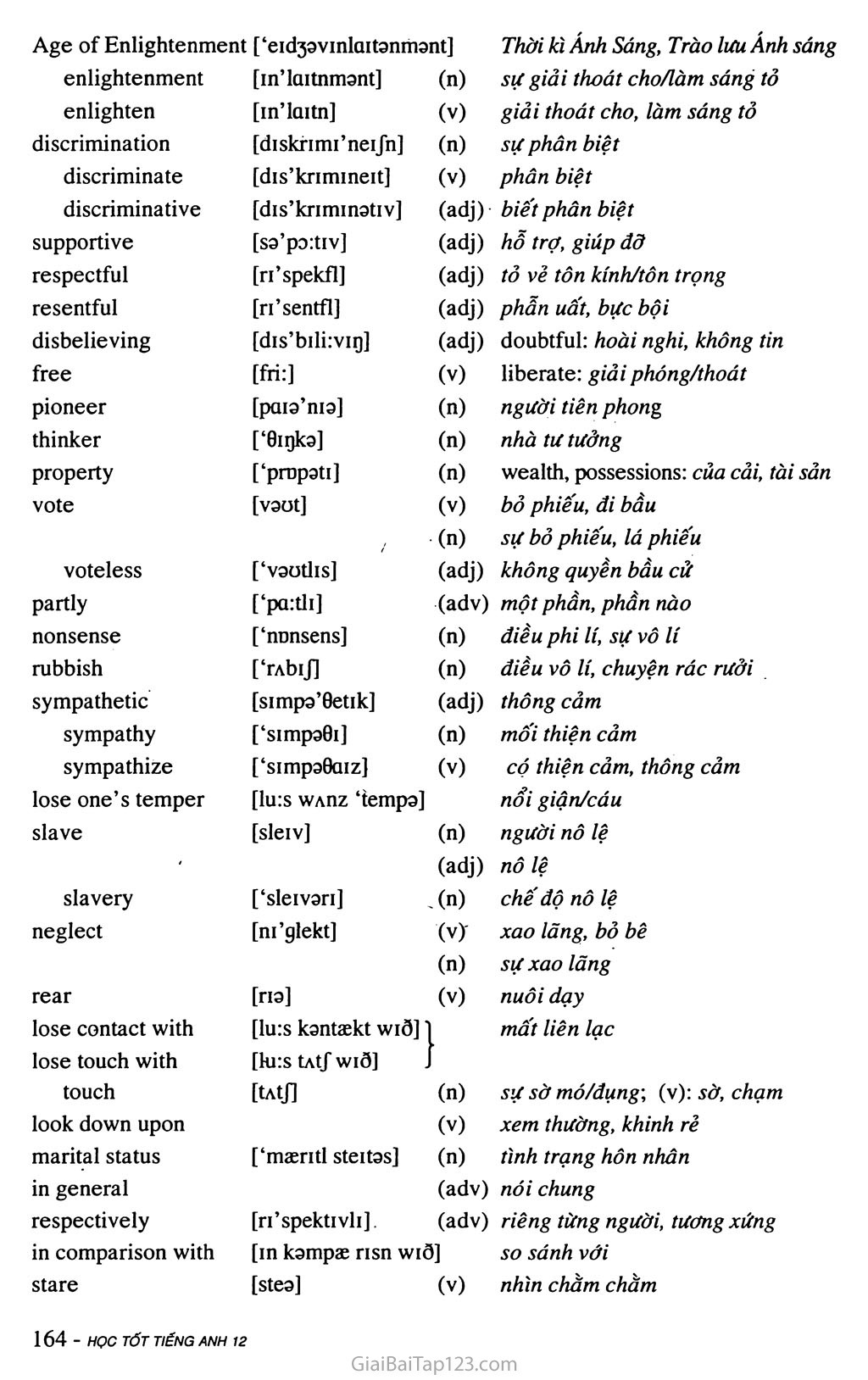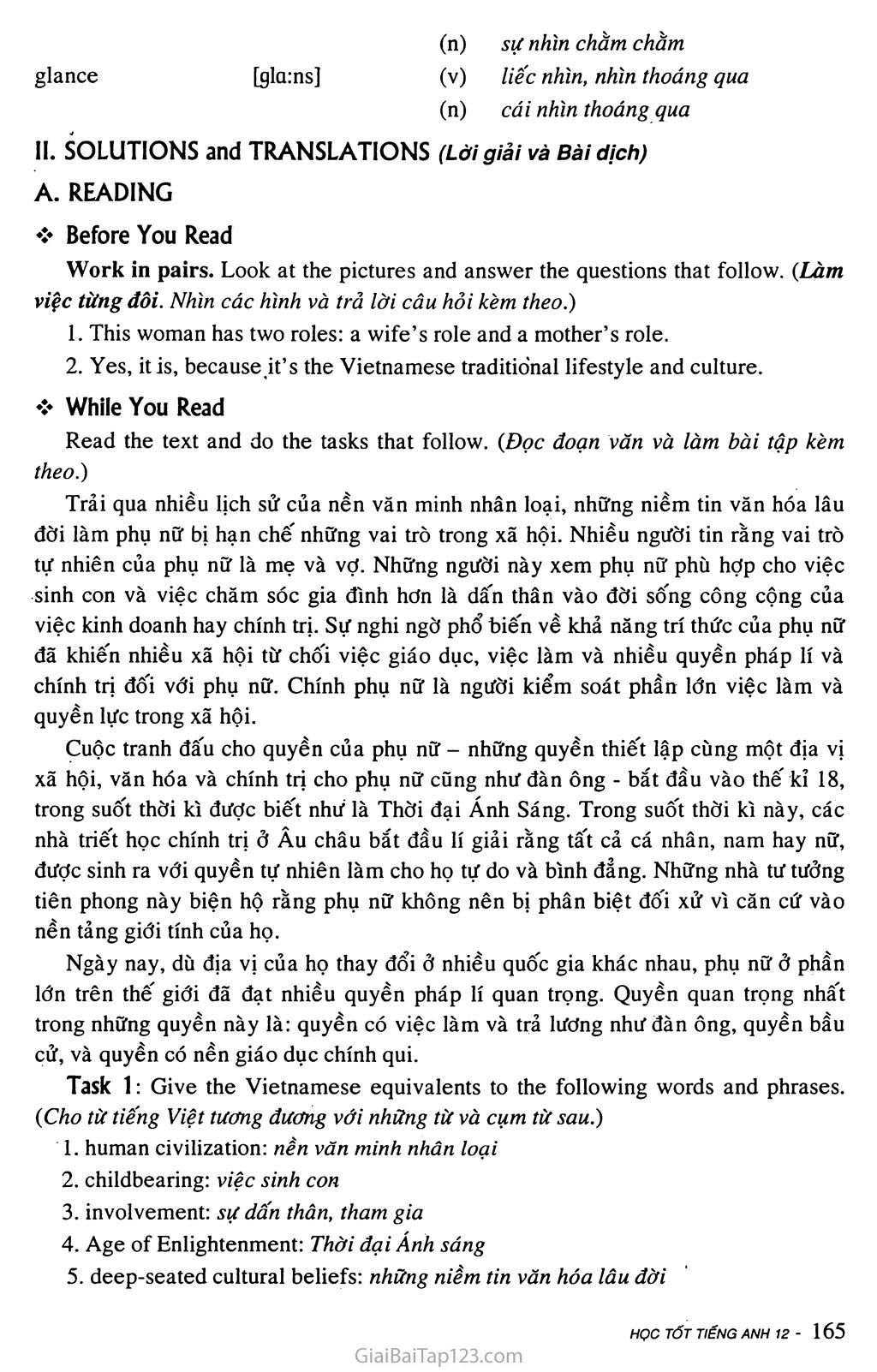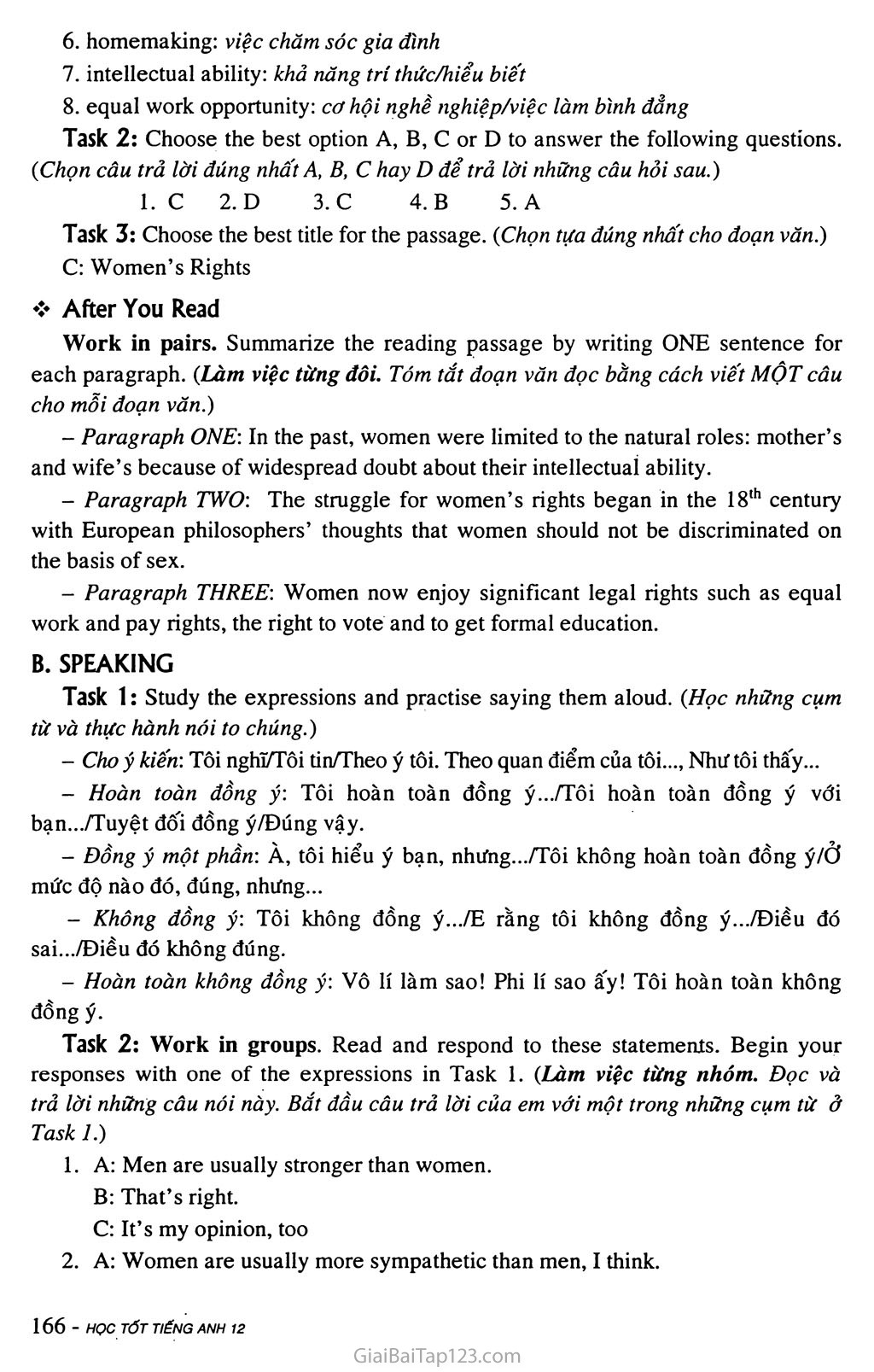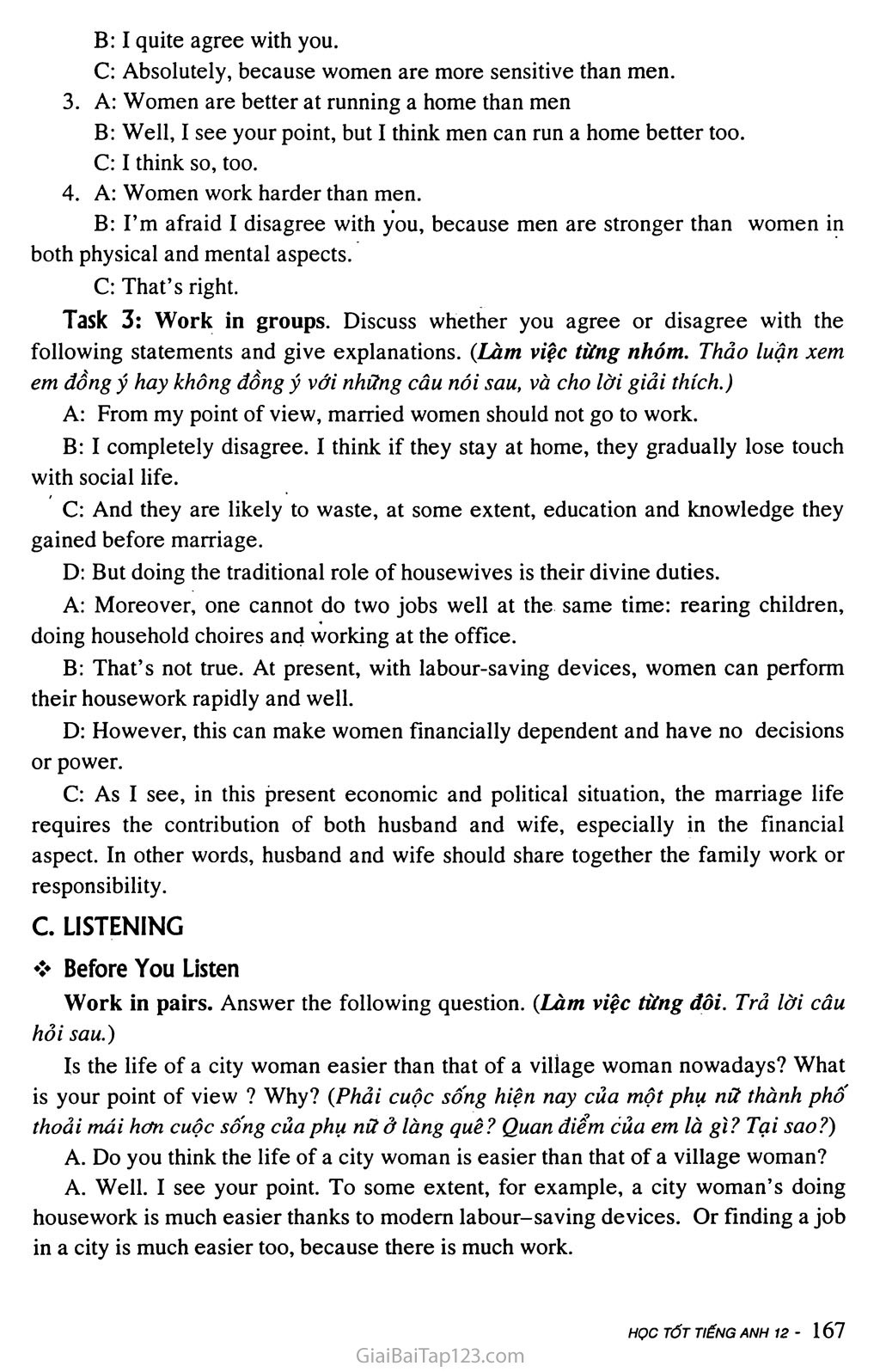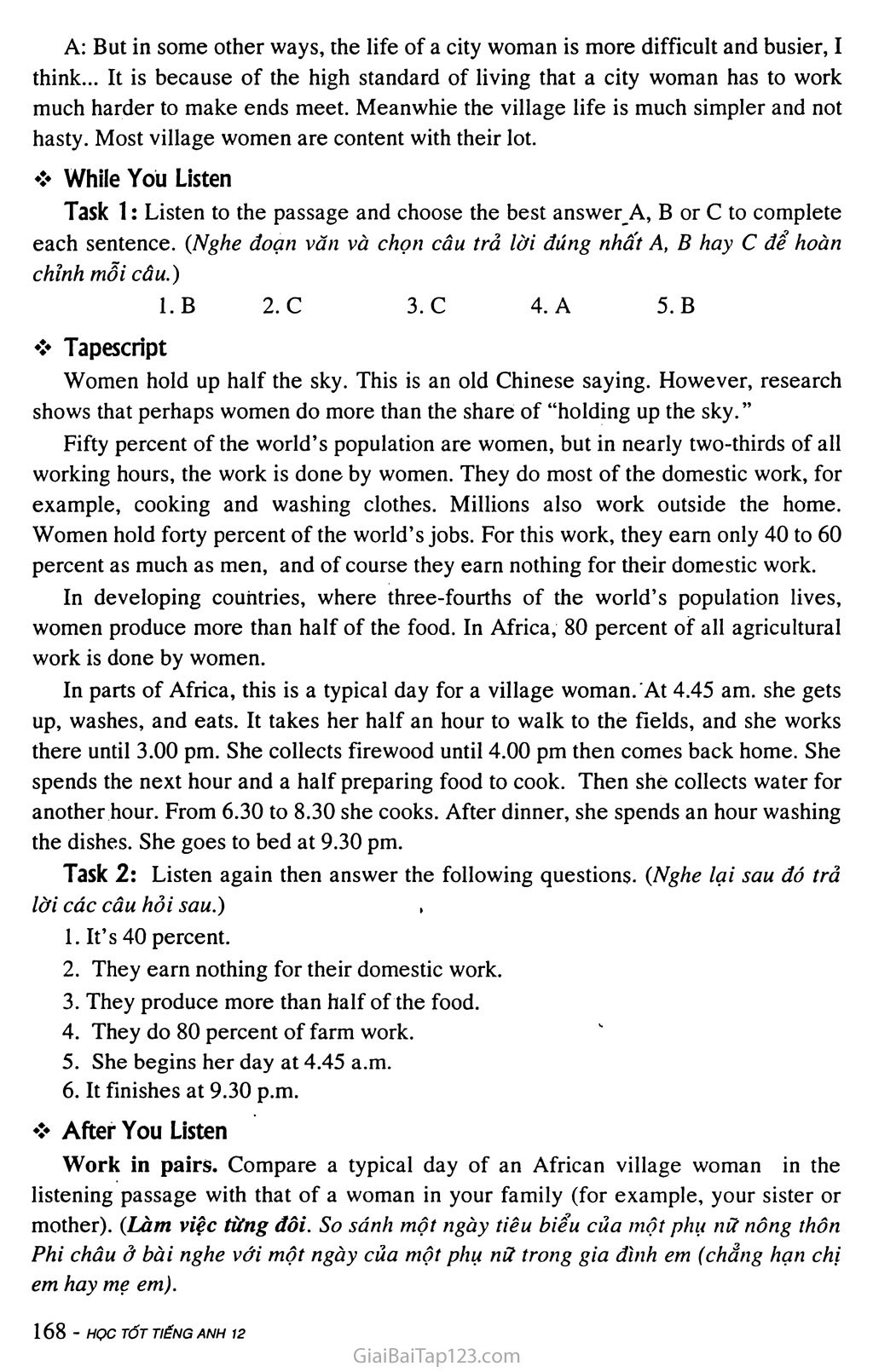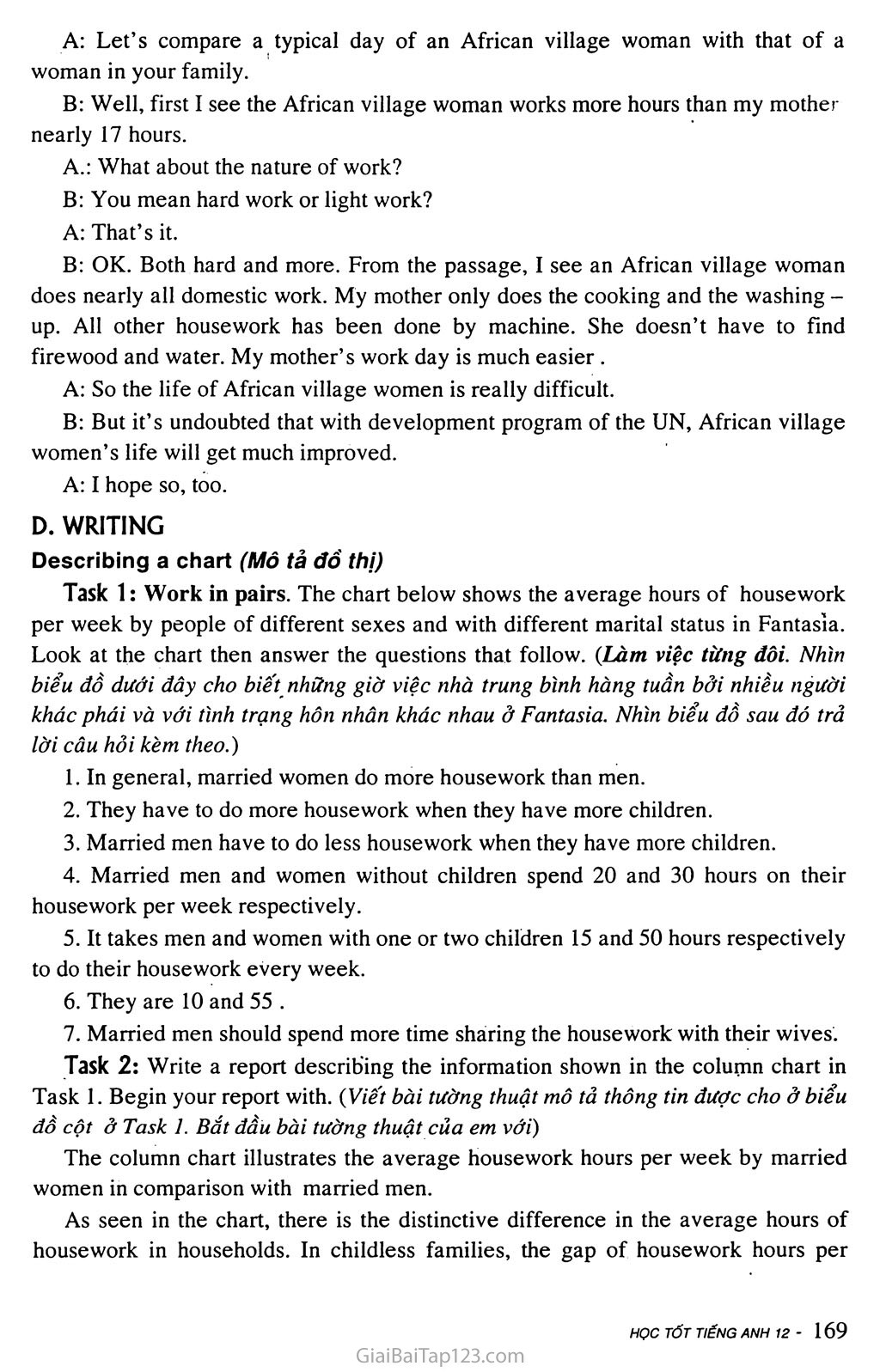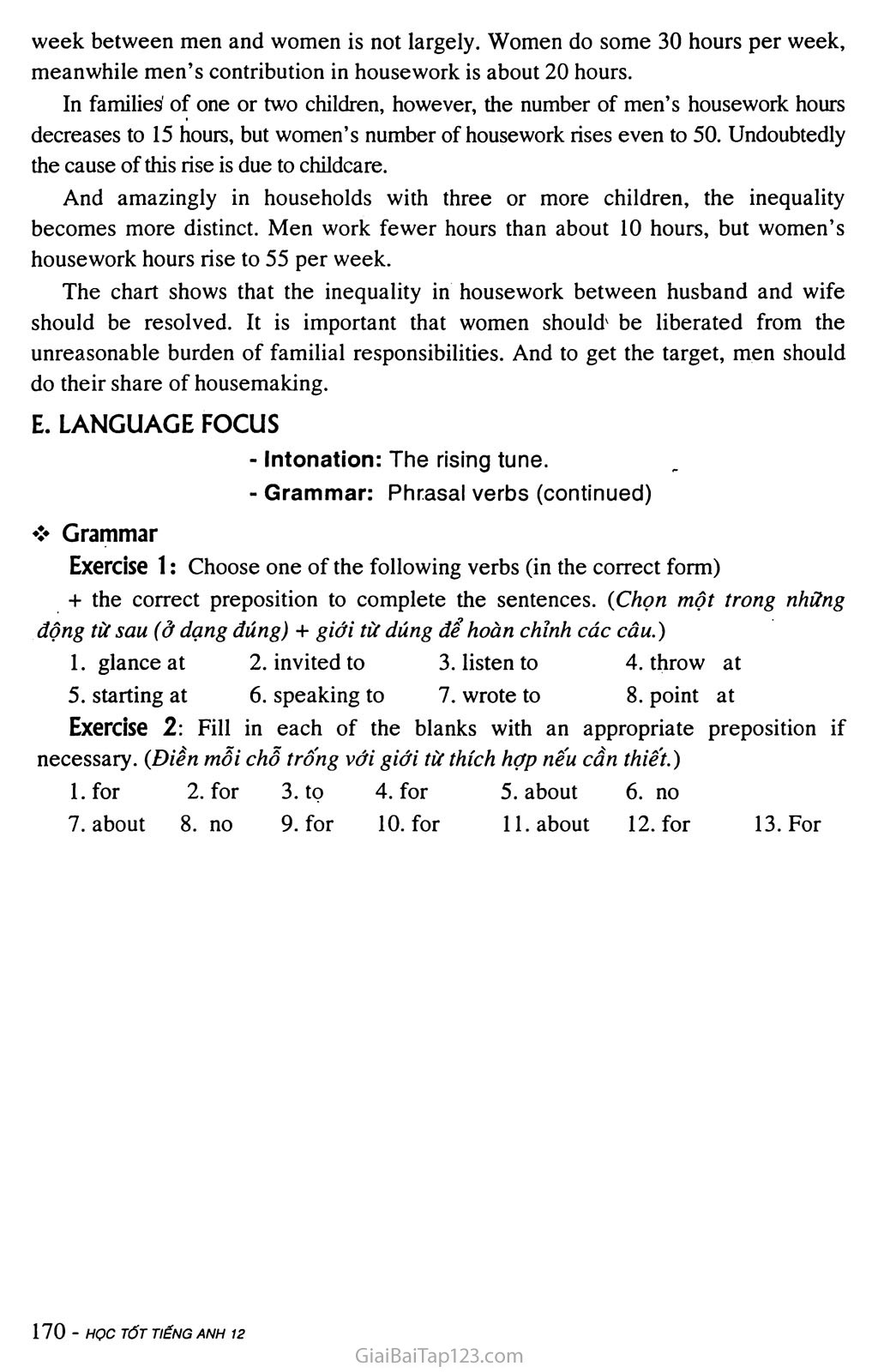Giải tiếng Anh lớp 12 Unit 15: WOMEN IN SOCIETY
WOMEN IN SOCIETY
(Phụ nữ trong xã hội)
I. VOCABULARY
typical
[‘tipikl]
(adj)
tiêu biểu, đặc trưng
civilization
[civilai’zeifn]
(n)
nền văn minh
civilize
[‘civilaiz]
(V)
làm cho văn minh
civilizable
[‘civilaizobl]
(adj)
có thể khai hóa
deep-seated
[di:p si:tid]
(adj)
ăn sâu, lâu đời
belief
[bi’li:f]
(n)
niềm tin
believe
[bi’li.v]
(V)
tin
believable
[bi’lkvabl]
(adj)
credible: có thể tin
suit for
[su:t fa]
(V)
thích hợp
childbearing
[‘tfaildbeorir)]
(n)
việc sinh con
childrearing
[‘tfaild rmrig]
(n)
việc nuôi dạy con
homemaking
[‘hoomeikig]
(n) công việc nội trợ, việc chăm sóc gia đình
homemaker
[‘hoomeiko]
(n)
người nội trợ
widespread
[‘waispred]
(adj)
phổ biến, lan rộng
intellectual
[inte’lektfool]
(adj)
thuộc trí thức
intellect
[‘intelekt]
(n)
trí tuệ, khả năng hiểu biết
intellectualize
[inte’lektfoolaiz]
(V)
trí thức hóa
deny
[dl’nai]
(V)
từ chối
denial
[di’naml]
(n)
sự từ chối
legal
[‘li:gl]
(adj)
thuộc luật pháp, hợp pháp
illegal
[I’lhgl]
(adj)
bất hợp pháp, phi pháp
status
[‘steitos]
(n)
địa vị
Age of Enlightenment [‘eidjovinlaitonmont] Thời kì Ánh Sáng, Trào lưu Ánh sáng
enlightenment
[in’laitnmont]
(n)
sự giải thoát cho/làm sáng tỏ
enlighten
[in’laitn]
(V)
giải thoát cho, làm sáng tỏ
discrimination
[diskrimi’neijn]
(n)
sự phân biệt
discriminate
[dis’krimineit]
(V)
phân biệt
discriminative
[dis’kriminotiv]
(adj)
biết phân biệt
supportive
[so’po:tiv]
(adj)
hỗ trợ, giúp đỡ
respectful
[ri’spekfl]
(adj)
tỏ vẻ tôn kính/tôn trọng
resentful
[ri’sentfl]
(adj)
phẫn uất, bực bội
disbelieving
[dis’bilkvirj]
(adj)
doubtful: hoài nghi, không tin
free
[fri:]
(V)
liberate: giải phóng/thoát
pioneer
[paio’mo]
(n)
người tiên phong
thinker
t‘6ir)ko]
(n)
nhà tư tưởng
property
[‘pmpoti]
(n)
wealth, possessions: của cải, tài sản
vote
[voot]
(V)
bỏ phiếu, đi bầu
(n)
sự bỏ phiếu, lá phiếu
voteless
[‘vootlis]
(adj)
không quyền bầu cử
partly
[*pa:tli]
(adv) một phần, phần nào
nonsense
[‘nnnsens]
(n)
điều phi lí, sự vô lí
rubbish
[‘rAbiJl
(n)
điều vô lí, chuyện rác rưởi
sympathetic
[simpo’fletik]
(adj)
thông cảm
sympathy
[‘simpofli]
(n)
mô'i thiện cảm
sympathize
[‘simpodaiz]
(V)
cộ thiện cảm, thông cảm
lose one’s temper
[lu:s WAnz ‘tempo]
nổi giận/cáu
slave
[sleiv]
(n)
người nô lệ
(adj)
nô lệ
slavery
[‘sleivori]
.(n)
chế độ nô lệ
neglect
[m’glekt]
(V)-
xao lãng, bỏ bê
rear
[rio]
(n)
(V)
sự xao lãng nuôi dạy
lose contact with
[lu:s kontskt wid] ]
mất liên lạc
lose touch with
touch
[lu:s tAtf wid] J
[tAtJl
(n)
sự sờ mó/đụng-, (v): sờ, chạm
look down upon
(V)
xem thường, khinh rẻ
marital status
[‘masritl steitos]
(n)
tình trạng hôn nhân
in general
(adv) nói chung
respectively
[ri’spektivh].
(adv)
riêng từng người, tương xứng
in comparison with
[in kompae risn wid]
so sánh với
stare
[steo]
(V)
nhìn chằm chằm
glance
[gla:ns]
(n) sự nhìn chằm chằm (v) liếc nhìn, nhìn thoáng qua
(n) cái nhìn thoáng qua
II. SOLUTIONS and TRANSLATIONS (Lờigiải và Bài dịch)
A. READING
Before You Read
Work in pairs. Look at the pictures and answer the questions that follow. (Làm việc từng đôi. Nhìn các hình và trả lời câu hỏi kèm theo.)
This woman has two roles: a wife’s role and a mother’s role.
Yes, it is, because it’s the Vietnamese traditional lifestyle and culture.
While You Read
Read the text and do the tasks that follow. (Đọc đoạn văn và làm bài tập kèm theo.)
Trải qua nhiều lịch sử của nền văn minh nhân loại, những niềm tin văn hóa lâu đời làm phụ nữ bị hạn chế những vai trò trong xã hội. Nhiều người tin rằng vai trò tự nhiên của phụ nữ là mẹ và vợ. Những người này xem phụ nữ phù hợp cho việc sinh con và việc chăm sóc gia đình hơn là dấn thân vào đời sông công cộng của việc kinh doanh hay chính trị. Sự nghi ngờ phổ biến về khả năng trí thức của phụ nữ đã khiến nhiều xã hội từ chòi việc giáo dục, việc làm và nhiều quyền pháp lí và chính trị đôi với phụ nữ. Chính phụ nữ là người kiểm soát phần lớn việc làm và quyền lực trong xã hội.
Cuộc tranh đấu cho quyền của phụ nữ - những quyền thiết lập cùng một địa vị xã hội, văn hóa và chính trị cho phụ nữ cũng như đàn ông - bắt đầu vào thế kỉ 18, trong suôi thời kì được biết như là Thời đại Ánh Sáng. Trong suôi thời kì này, các nhà triết học chính trị ở Âu châu bắt đầu lí giải rằng tất cả cá nhân, nam hay nữ, được sinh ra với quyền tự nhiên làm cho họ tự do và bình đẳng. Những nhà tư tưởng tiên phong này biện hộ rằng phụ nữ không nên bị phân biệt đôi xử vì căn cứ vào nền tảng giới tính của họ.
Ngày nay, dù địa vị của họ thay đổi ở nhiều quốc gia khác nhau, phụ nữ ở phần lớn trên thế giới đã đạt nhiều quyền pháp lí quan trọng. Quyền quan trọng nhâì trong những quyền này là: quyền có việc làm và trả lương như đàn ông, quyền bầu cử, và quyền có nền giáo dục chính qui.
Task 1: Give the Vietnamese equivalents to the following words and phrases. (Cho từ tiếng Việt tương đương với những từ và cụm từ sau.)
human civilization: nền văn minh nhân loại
childbearing: việc sinh con
involvement: sự dấn thân, tham gia
Age of Enlightenment: Thời đại Ánh sáng
deep-seated cultural beliefs: những niềm tin văn hóa lâu đời
homemaking: việc chăm sóc gia đình
intellectual ability: khả năng trí thức/hiểu biết
equal work opportunity: cơ hội nghề nghiệp/việc làm bình đẳng
Task 2: Choose the best option A, B, c or D to answer the following questions. {Chọn câu trả lời đúng nhất A, B, c hay D để trả lời những câu hỏi sau.)
1. c 2. D 3.C 4. B 5. A
Task 3: Choose the best title for the passage. (Chọn tựa đúng nhất cho đoạn văn.)
C: Women’s Rights ❖ After You Read
Work in pairs. Summarize the reading passage by writing ONE sentence for each paragraph. (Làm việc từng đôi. Tóm tắt đoạn văn đọc bằng cách viết MỘT câu cho mỗi đoạn văn.)
Paragraph ONE: In the past, women were limited to the natural roles: mother’s and wife’s because of widespread doubt about their intellectual ability.
Paragraph TWO: The struggle for women’s rights began in the 18th century with European philosophers’ thoughts that women should not be discriminated on the basis of sex.
Paragraph THREE: Women now enjoy significant legal rights such as equal work and pay rights, the right to vote and to get formal education.
B. SPEAKING
Task 1: Study the expressions and practise saying them aloud. (Học những cụm từ và thực hành nói to chúng.)
Cho ý kiến: Tôi nghĩTTôi tin/Theo ý tôi. Theo quan điểm của tôi..., Như tôi thấy...
Hoàn toàn đồng ý: Tôi hoàn toàn đồng ý.../Tôi hoàn toàn đồng ý với bạn.../Tuyệt đốì đồng ý/Đúng vậy.
Đồng ý một phần: À, tôi hiểu ý bạn, nhưng.../Tôi không hoàn toàn đồng ý /ở mức độ nào đó, đúng, nhưng...
Không đồng ý: Tôi không đồng ý.../E rằng tôi không đồng ý.../Điều đó sai.../Điều đó không đúng.
Hoàn toàn không đồng ý: Vô lí làm sao! Phi lí sao ấy! Tôi hoàn toàn không đồng ý.
Task 2: Work in groups. Read and respond to these statements. Begin your responses with one of the expressions in Task I. (Làm việc từng nhóm. Đọc và trả lời những câu nói này. Bắt dầu câu trả lời của em với một trong những cụm từ ở Task 1.)
A: Men are usually stronger than women.
B: That’s right.
C: It’s my opinion, too
A: Women are usually more sympathetic than men, I think.
B: I quite agree with you.
C: Absolutely, because women are more sensitive than men.
A: Women are better at running a home than men
B: Well, I see your point, but I think men can run a home better too.
C: I think so, too.
A: Women work harder than men.
B: I’m afraid I disagree with you, because men are stronger than women in both physical and mental aspects.
C: That’s right.
Task 3: Work in groups. Discuss whether you agree or disagree with the following statements and give explanations. (Làm việc từng nhóm. Thảo luận xem em đồng ý hay không đồng ý với những câu nói sau, và cho lời giải thích.)
A: From my point of view, married women should not go to work.
B: I completely disagree. I think if they stay at home, they gradually lose touch with social life.
C: And they are likely to waste, at some extent, education and knowledge they gained before marriage.
D: But doing the traditional role of housewives is their divine duties.
A: Moreover, one cannot do two jobs well at the same time: rearing children, doing household choires and working at the office.
B: That’s not true. At present, with labour-saving devices, women can perform their housework rapidly and well.
D: However, this can make women financially dependent and have no decisions or power.
C: As I see, in this present economic and political situation, the marriage life requires the contribution of both husband and wife, especially in the financial aspect. In other words, husband and wife should share together the family work or responsibility.
c. LISTENING
❖ Before You Listen
Work in pairs. Answer the following question. (Làm việc từng đôi. Trả lời câu hỏi sau.)
Is the life of a city woman easier than that of a village woman nowadays? What is your point of view ? Why? (Phải cuộc sống hiện nay của một phụ nữ thành phô' thoải mái hơn cuộc sống của phụ nữ ở làng quê? Quan điểm của em là gì? Tại sao?)
A. Do you think the life of a city woman is easier than that of a village woman?
A. Well. I see your point. To some extent, for example, a city woman’s doing housework is much easier thanks to modern labour-saving devices. Or finding a job in a city is much easier too, because there is much work.
A: But in some other ways, the life of a city woman is more difficult and busier, I think... It is because of the high standard of living that a city woman has to work much harder to make ends meet. Meanwhie the village life is much simpler and not hasty. Most village women are content with their lot.
While You Listen
Task 1 : Listen to the passage and choose the best answer A, B or c to complete each sentence. (Nghe đoạn văn và chọn câu trả lời đúng nhất A, B hay c để hoàn chỉnh mỗi câu.)
l.B 2. c 3.C 4. A 5.B
Tapescript
Women hold up half the sky. This is an old Chinese saying. However, research shows that perhaps women do more than the share of “holding up the sky.”
Fifty percent of the world’s population are women, but in nearly two-thirds of all working hours, the work is done by women. They do most of the domestic work, for example, cooking and washing clothes. Millions also work outside the home. Women hold forty percent of the world’s jobs. For this work, they earn only 40 to 60 percent as much as men, and of course they earn nothing for their domestic work.
In developing countries, where three-fourths of the world’s population lives, women produce more than half of the food. In Africa, 80 percent of all agricultural work is done by women.
In parts of Africa, this is a typical day for a village woman. At 4.45 am. she gets up, washes, and eats. It takes her half an hour to walk to the fields, and she works there until 3.00 pm. She collects firewood until 4.00 pm then comes back home. She spends the next hour and a half preparing food to cook. Then she collects water for another hour. From 6.30 to 8.30 she cooks. After dinner, she spends an hour washing the dishes. She goes to bed at 9.30 pm.
Task 2: Listen again then answer the following questions. (Nghe lại sau đó trả lời các câu hỏi sau.) ,
It’s 40 percent.
They earn nothing for their domestic work.
They produce more than half of the food.
They do 80 percent of farm work.
She begins her day at 4.45 a.m.
It finishes at 9.30 p.m.
After You Listen
Work in pairs. Compare a typical day of an African village woman in the listening passage with that of a woman in your family (for example, your sister or mother). {Làm việc từng đôi. So sánh một ngày tiêu biểu của một phụ nữ nông thôn Phi châu ở bài nghe với một ngày của một phụ nữ trong gia đình em (chẳng hạn chị em hay mẹ em).
A: Let’s compare a typical day of an African village woman with that of a woman in your family.
B: Well, first I see the African village woman works more hours than my mother nearly 17 hours.
A.: What about the nature of work?
B: You mean hard work or light work?
A: That’s it.
B: OK. Both hard and more. From the passage, I see an African village woman does nearly all domestic work. My mother only does the cooking and the washing - up. All other housework has been done by machine. She doesn’t have to find firewood and water. My mother’s work day is much easier .
A: So the life of African village women is really difficult.
B: But it’s undoubted that with development program of the UN, African village women’s life will get much improved.
A: I hope so, too.
D. WRITING
Describing a chart (Mô tả đồ thị)
Task 1: Work in pairs. The chart below shows the average hours of housework per week by people of different sexes and with different marital status in Fantasia. Look at the chart then answer the questions that follow. {Làm việc từng đôi. Nhìn biểu đồ dưới đây cho biết những giờ việc nhà trung bình hàng tuần bởi nhiều người khác phái và với tình trạng hôn nhăn khác nhau ở Fantasia. Nhìn biểu đồ sau đó trả lời câu hỏi kèm theo.)
In general, married women do more housework than men.
They have to do more housework when they have more children.
Married men have to do less housework when they have more children.
Married men and women without children spend 20 and 30 hours on their housework per week respectively.
It takes men and women with one or two children 15 and 50 hours respectively to do their housework every week.
They are 10 and 55 .
Married men should spend more time sharing the housework with their wives.
Task 2: Write a report describing the information shown in the column chart in
Task 1. Begin your report with. {Viết bài tường thuật mô tả thông tin được cho ở biểu đồ cột ở Task 1. Bắt đầu bài tường thuật của em với)
The column chart illustrates the average housework hours per week by married women in comparison with married men.
As seen in the chart, there is the distinctive difference in the average hours of housework in households. In childless families, the gap of housework hours per week between men and women is not largely. Women do some 30 hours per week, meanwhile men’s contribution in housework is about 20 hours.
In families' of one or two children, however, the number of men’s housework hours decreases to 15 hours, but women’s number of housework rises even to 50. Undoubtedly the cause of this rise is due to childcare.
And amazingly in households with three or more children, the inequality becomes more distinct. Men work fewer hours than about 10 hours, but women’s housework hours rise to 55 per week.
The chart shows that the inequality in housework between husband and wife should be resolved. It is important that women should be liberated from the unreasonable burden of familial responsibilities. And to get the target, men should do their share of housemaking.
E. LANGUAGE FOCUS
Intonation: The rising tune.
Grammar: Phrasal verbs (continued)
❖ Grammar
Exercise 1: Choose one of the following verbs (in the correct form)
+ the correct preposition to complete the sentences. {Chọn một trong những động từ sau (ở dạng đúng) + giới từ dứng để hoàn chỉnh các câu.)
glance at 2. invited to 3. listen to 4. throw at
starting at 6. speaking to 7. wrote to 8. point at
Exercise 2: Fill in each of the blanks with an appropriate preposition if
necessary. {Điền mỗi chỗ trống với giới từ thích hợp nếu cần thiết.)
l.for 2. for 3. tọ 4. for 5. about 6. no
about 8. no 9. for 10. for 11. about 12. for 13. For

